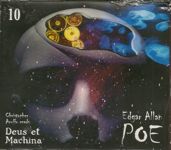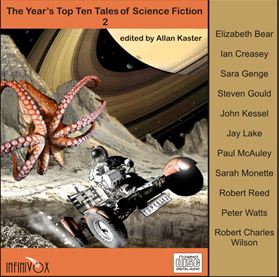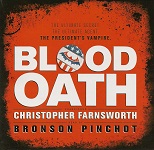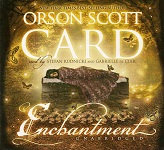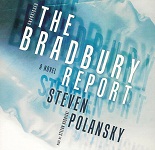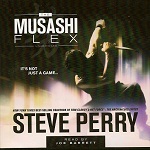
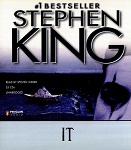 IT
IT
By Stephen King; Read by Steven Weber
45 hours – [UNABRIDGED]
Publisher: Penguin Audio
Published: 2010
Themes: / Horror / Childhood / Adulthood / Monsters /
You don’t have to look back to see those children; part of your mind will see them forever, live with them forever, love with them forever. They are not necessarily the best part of you, but they were once the repository of all you could become.
—Stephen King, IT
What quality separates an adult from a child? Is it responsibility in the former and unbridled freedom in the latter? Do adults possess a higher order of thinking? Or, to take a cynical view, are adults merely physically larger (perhaps they/we never really do grow up)?
I happen to think there is a difference, though it’s hard to say precisely what. You could describe adulthood as a phase through which we all must pass, else we remain stunted and undeveloped, looking backward instead of forward, unable to transform into the mature beings that the hard world requires. Indefinable and amorphous, you may as well call this period of transition it. Stephen King did, and in 1985 he wrote a massive book by the same name about this very subject.
As is King’s forte, IT is also a horror story, and a terrifying one at that. The villain of IT is a creature that lurks in the sewers of Derry, Maine, one that takes the shape of our worst fears. IT’s favorite shape is a painted clown known as Pennywise, friendly at first glance but whose greasepaint smile reveals a double-row of Gillette razor teeth. Pennywise can also take the form of a werewolf, the Creature from the Black Lagoon, Frankenstein, and more. Whatever a particular child finds most terrifying, Pennywise can take its shape.
Pennywise has been preyed on the children of Derry for untold generations, emerging from a deep slumber in the sewers every 27 years to feed. After a year of gruesome killings (written up in the press as mysterious child disappearances, or frequently blamed on other sources), the cycles end with a culminating event, typically an awful orgy of destruction, after which the creature resumes its hibernation.
But Pennywise—aka., IT—always comes back. Derry is perennially under its pall and seems to accept the darkness as “just the way things are” and the horrors continue in cyclical fashion. But then comes the summer of 1958. A group of 10 and 11-year-old children called the Loser’s Club, led by a stuttering, charismatic child known as Bill Denbrough, unite to battle Pennywise. All have had close brushes with the monster. Scarred by their experiences but united in purpose (Bill’s six year old brother Georgie is dragged into the sewer and killed in a gruesome scene at the beginning of the novel, and Bill vows revenge), they travel into Derry’s byzantine sewer systems to put an end to the monster. Following an epic confrontation in the creature’s den the children vow to return to Derry should Pennywise/IT ever return.
One of the club, Mike Hanlon, remains behind in the ensuring decades to watch and wait. When Pennywise does re-emerge 27 years later the children of the Loser’s Club are now adults in their late 30s. Some higher power has mercifully allowed them to forget the terrible events of their childhood and move on with their lives. But now they have to fight the terrible evil once more and growing up has diminished them in some way. This time around they find themselves less equipped to fight.
IT is a great story full of memorable events, places, and characters. King imbues Derry with its own personality, and the town feels like a member of the cast. King skillfully weaves in events from Derry’s awful past, including past murder sprees and the culminating bloodbaths that sent IT back into the sewers, including a horrific nightclub fire (The Black Spot) and the explosion of the Kitchener Ironworks.
But in the end, what I like most about IT, and what separates the book from much of the rest of King’s oeuvre, is its thoughtful exploration of that amorphous crossing of the bar from youth to maturity. To get where you want to go in life you have to grow up, King says, but it’s not a simple process. The transition from childhood to adulthood is a complex and bittersweet, its benefits equivocal. Adulthood brings with it at least some measure of financial, parental, and geographic freedom. We can leave those hometowns that are so frequently a source of shame and failure and hidden darkness. But in so doing we lose a lot, too—our dreams, our innocence, our closest friends, and sometimes even our faith in a higher power. And the only way to defeat Pennywise—that monstrous, childhood IT—is through faith.
King has been accused by his critics of being shallow, all style and no substance (he did himself no favors by once calling himself “the literary equivalent of a Big Mac and Fries”). But I’ve found that his best material has more depth than meets than eye. IT is not just about battling monsters. Or rather it is about that, but the monsters are also the real, adult fears of loneliness, guilt, and dependency, of growing up, of confronting the monsters of one’s past and trying to move on. We are all incomplete until we face our past and determine who we are, what we stand for, and how we want to live our lives. This personal struggle, as much as visceral, horrific battles with Pennywise, is what brings me back to IT again and again.
I will say that IT is not without its problems, including a sequence that remains controversial among King’s readers. Without spoiling the story, it involves a coming of age ritual in the sewers that is a bit off-putting and jarring, even though I do understand its purposes. Some of the characters feel a bit one-trick and allegorical (representative of concepts rather than three-dimensional human beings). Other readers have complained that IT’s big secret—Pennywise’s final reveal—a bit of a let-down after 1,000 pages of build up. King is unfortunately often guilty of unsatisfying endings to otherwise great novels, and IT arguably suffers from the same problem. I don’t necessarily agree, as I find the epilogue incredibly satisfying, but others have made this criticism.
But despite its flaws, IT is one of my favorite books by King. With a memorable monster, a nice cast of characters, and a compelling, decades-spanning storyline with an epic final showdown, IT is a horrific page turner with deeper literary ambitions that it mostly fulfills.
Posted by Brian Murphy






